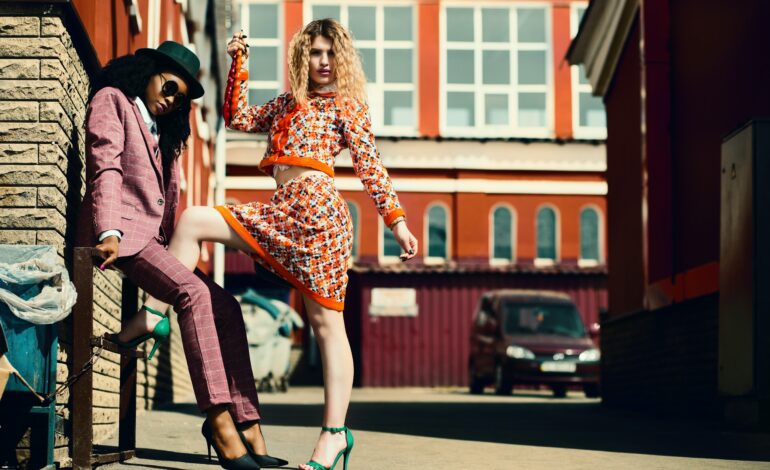
If you’ve ever been out shopping and noticed a label on a piece of clothing that said “made responsibly,” or perhaps even “eco-friendly,” chances are you were looking at sustainable fashion. Sustainable fashion, also known as eco-fashion or ethical fashion, refers to the design, production, and consumption of clothing and accessories in a way that minimizes the negative impact on the environment and respects social and ethical standards. It aims to create a more sustainable and responsible approach to fashion throughout its entire lifecycle.
Sustainable fashion is about more than just the materials used in making clothes: it’s about how those materials are sourced in an environmentally conscious way, how they’re produced using ethical labor practices, how they’re shipped to your home in an efficient way with minimal environmental impact (for example by using less fuel), how they’re disposed of after you’re done wearing them (recycling is always best!), and even how they’re marketed and sold so that their production doesn’t contribute to human trafficking or other forms of exploitation.
Here are some key concepts and practices associated with sustainable fashion:
Ethical and fair trade
When you buy sustainable fashion, you’re making a statement. You’re saying that you care about your world, and you want to help make it better. Sustainable fashion is not just about what’s on the inside—it’s how that product got there in the first place. Sustainable fashion doesn’t just mean not harming the environment; it means working with companies that are ethical, fair, and socially conscious.
Sustainable fashion promotes fair working conditions and fair wages for workers in the fashion industry. It emphasizes the importance of ethical sourcing, ensuring that the materials used in clothing production are obtained in a responsible and socially conscious manner.
Environmentally friendly materials
Sustainable fashion is about more than just looking good. It’s about caring for the environment, reducing your carbon footprint, and making conscious choices that impact our planet.
There are a number of ways to incorporate sustainability into your wardrobe: sustainable fashion encourages the use of eco-friendly materials such as organic cotton, hemp, bamboo and recycled fibers. These materials have a lower impact on the environment compared to conventional materials like synthetic fabrics or non-organic cotton which require large amounts of water, pesticides and energy during production.
When you buy sustainable clothing items you are helping to reduce your impact on the environment while also supporting ethical brands who use sustainable practices in their factories and supply chains.
Reducing waste
Reducing waste is one of the most important things we can do to preserve the environment. It’s easy to think that doing your part by recycling paper, using energy-efficient light bulbs, and turning off the faucet when you brush your teeth will make a difference. But when it comes to reducing waste, there are so many other steps we can take.

Wearing sustainable fashion is one way we can reduce our individual impact on the environment in a big way. Sustainable fashion aims to minimize waste throughout the production and consumption process. This includes using cutting techniques that optimize fabric usage, recycling and upcycling materials, and implementing efficient production processes to reduce textile waste. Additionally, sustainable fashion promotes extending the lifecycle of garments through repair, alteration, and reuse.
Slow fashion
Slow fashion is the opposite of fast fashion. It’s all about quality over quantity, timeless designs and durable products, and being more mindful of your purchasing habits and investing in well-made items.
Slow fashion focuses on quality over quantity, which means that it encourages consumers to buy fewer pieces but invest in well-made items that can last for years. Instead of following trends and buying new clothes every season, slow fashion encourages you to wear the same thing for years (or even decades) so you don’t waste money on throwaway clothing. Sustainable fashion emphasizes quality over quantity, promoting timeless designs and durable products that can be worn for a longer period. It encourages consumers to be more mindful of their purchasing habits and invest in well-made, long-lasting items.
Circular economy
Fashion is an industry that is generally considered to be unsustainable. Most garments are made from synthetic materials, which are non-biodegradable and can take hundreds of years to break down. Even natural fibers like cotton are often grown using harmful pesticides and fertilizers, and then transported thousands of miles to reach consumers.
Sustainable fashion embraces the concept of a circular economy, which aims to keep resources in use for as long as possible. This involves designing garments with recyclability in mind, promoting clothing rental and secondhand markets, and developing recycling and upcycling initiatives to give new life to old textiles.
Consumer awareness and education
The fashion industry has a staggering impact on people and the planet. The apparel industry is one of the top polluters in the world, and it’s estimated that two-thirds of all garments produced are never worn.
While we can’t stop the clothing industry from churning out new clothes, we can make sure that you know what you’re buying. Whether you’re looking for sustainable fashion or something more traditional, we’ll help you find the right piece that fits your budget and your style. We believe in giving back to our community, so we donate $1 from every item sold to The Nature Conservancy, an organization dedicated to protecting nature for future generations.
Sustainable fashion is a movement that seeks to create a more socially and environmentally responsible fashion industry. It offers an alternative approach that prioritizes the well-being of people and the planet.
The principles of sustainable fashion are not new, but their application in the industry is still being developed. Sustainable fashion is gaining momentum as more consumers become aware of its benefits, which include reducing pollution, waste, exploitation, and climate change.
RUCHI RATHOR Founder & CEO
Payomatix Technologies Pvt. Ltd.
FOUNDER AND INVESTOR | PAYMENTS PROCESSING EXPERT | MERCHANT ACCOUNT SOLUTIONS | WHITE LABELLED PAYMENT
GATEWAY | Dreamer, Creator, Achiever, Constantly Evolving
Website Ruchi Rathor: https://ruchirathor.com
Website Healing Heart https://thehealingheart.me/
Instagram https://www.instagram.com/_ruchirathor_/
LinkedIn https://www.linkedin.com/in/ruchirathor12/
Facebook https://www.facebook.com/ruchi.rathor.magnificient
Tumblr https://www.tumblr.com/blog/ruchirathor-thehealingheart
Medium https://medium.com/@ruchirathor_23436









